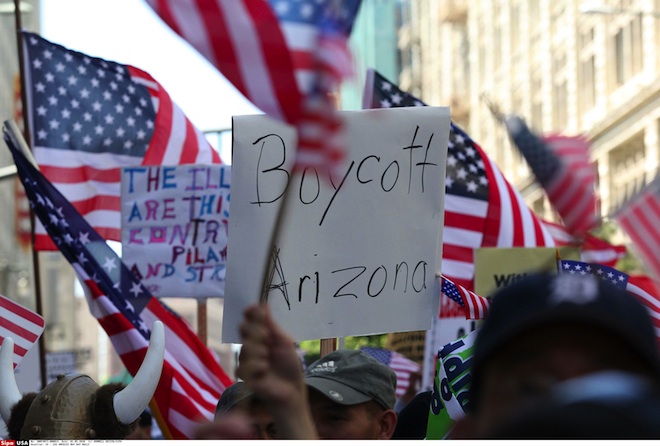By the end of Wednesday’s Supreme Court oral arguments on the constitutionality of Arizona’s immigration law, there was renewed hope for the law’s backers that at least some aspects of it might survive, although no clear majority emerged one way or another.
Justice Antonin Scalia led the charge among justices inclined to agree with Arizona. He passionately argued that the Constitution provides states the authority to craft immigration policy to protect their borders — an argument at odds with longstanding precedent.
“What does sovereignty mean if it does not include the ability to defend your borders? The states can police their borders,” Scalia said, suggesting that the White House opposes the law because it “does not want [immigration] law enforced rigorously.”
None of the other justices went that far — tellingly, not even Arizona made that argument — but Scalia’s bombastic line of questioning set the tone. Instead, the state argued that S.B. 1070 seeks narrow authority to cooperative with and assist the federal government in enforcing immigration law. The Obama administration counters that the Arizona measure unconstitutionally coerces the U.S. to refocus its approach to immigration enforcement. Issues of states’ rights and racial profiling were not relevant to the legal questions at hand.
The key swing votes in the case — Justices Anthony Kennedy, John Roberts and Samuel Alito — were all wrestling with how far states can go in writing immigration laws before they encroach on what is widely regarded as federal turf. More sympathy was expressed for the law’s provision that states can consult with the federal government about an arrested person’s immigration status than the parts that make it a state crime to violate one’s federal legal status.
“The discretion to prosecute … rests entirely with the attorney general,” said Roberts.
With Justice Elena Kagan having recused herself, the Obama administration needs four votes to win, as a 4-4 tie would defer to the lower courts that blocked the provisions. The administration’s lawyer, Donald Verrilli, was again outmatched by D.C. lawyer Paul Clement, who argued the case for Arizona. It was a rematch on another explosive political issue after the two faced off over the health care law one month ago.
Justices Stephen Breyer, Ruth Bader Ginsburg and Sonia Sotomayor are likely votes against key parts of the law. Justice Clarence Thomas and Antonin Scalia are expected to rule in favor of Arizona. The outcome hinges on where the remaining three come down.
At issue are four provisions of the law that 1) let police check a person’s legal status during unrelated lawful encounters, 2) criminalize one’s presence in Arizona without documentation, 3) criminalize working or looking for work without legal status, and 4) permit police to arrest people without a warrant if there’s suspicion that they’ve committed a deportable crime.










